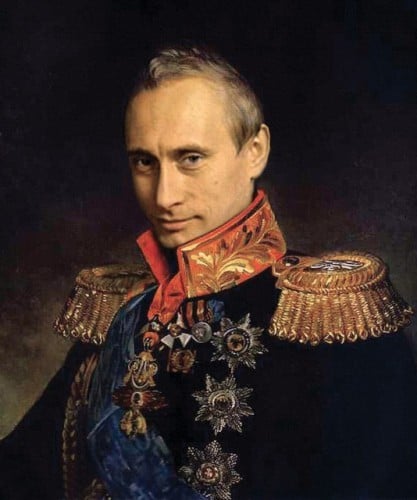Moscow held its traditional Victory Day military parade this week. The events in Ukraine made it a strange and troubling affair. The gap between the polished show on the Red Square, choreographed with customary precision, and the sordid battlefield reality 300 miles away, was plain to a detached observer.
In Russia, May 9 signifies much more than the end of World War II in Europe. It is a reminder, kept alive year after year, that the Great Patriotic War was a time of supreme sacrifice of an earlier generation. It is also a reaffirmation that the trial of 1941–1945 remains the foundational narrative of the modern Russian state. It is the path to the final reconciliation of the Reds and Whites, without which Russia cannot be healed.
Watching this year’s parade, I could not help recalling the magnificent, Prussian-style night parade of the East German army in October 1989 to mark the 40th anniversary of the German Democratic Republic–which I observed with disbelieving fascination–just days before the Wall finally crumbled, a mile away.
Far from heralding a successful finale of his “special military operation” in Ukraine, as some commentators have expected, President Vladimir Putin had nothing to offer that could be passed off as victory. He reiterated the standard claim that “Russia has preemptively repulsed an aggression” in what he described as “forced, timely, and the only correct decision by a sovereign, powerful and independent country.” He also scolded the West for failing to heed Russian demands for security guarantees and a rollback to NATO’s expansion, arguing that such provocation left Moscow no other choice but to launch an action in Ukraine.
Putin’s biggest problem is not his justification for the war, which is dubious but not entirely without merit. His biggest problem is that the war is going badly for him and for Russia. Putin’s war is still Russia’s war, for the time being. The ongoing paroxysm of Western Russophobia, raw and visceral, certainly helps rally Russian support behind him. Many a cultivated Russian—in Moscow and St. Petersburg, in particular—who dislikes Putin and disapproves of the war, yet finds himself unable to accept that he and his culture are so eagerly written off and collectively vilified by the West.
Regardless of the country’s nominally “mixed” political system, Putin as president of the Russian Federation enjoys de facto total power. It exceeds that of President Xi Jinping in China and may be compared to that of Recep Tayyip Erdogan in Turkey, a second-tier power. In the Russian world, whether Tsarist, Soviet, or Putinian, the quality of decision-making at the helm determines the fate of the realm—and always has. Peter the Great dragged Russia kicking and screaming into modernity. Catherine the Great, a German gone native, turned Russia into a great European power. Alexander I marched into Paris and was a potential hegemon of Europe in 1815 but settled for being a player in her concert instead. He was French in taste and outlook; his brother and successor, Nicholas I, was a humorless Prussian. Alexander II was a liberal and a Westerner; his son Alexander III a reactionary autocrat; his grandson Nicholas II a tragic waverer.
Most Western commentators fail to grasp that Putin did not abolish “democracy” (such as it was in Yeltsin’s Russia). He merely tied it to the monarchical archetype, which is appropriate to Russia’s tradition and political culture. By doing so, however, he has accepted full, paternal responsibility for what happens to Russia, good or bad.
Putin is at the top, but alone. There is nobody else there to share the blame for a growing list of strategic failures: Poor intelligence on the state of the Ukrainian military and the mood of the populace. Awful logistics of the Russian infantry. The shameful sinking of the Moskva warship. The inexplicable loss of more than $300 billion in assets, cash and gold, which had been left in Western banks and institutions. A dozen Russian generals killed, with many staff officers to boot, due to faulty communication security. That utterly miserable performance of his own spokesman, Dmitry Peskov, on Sky News. The list goes on.
Holders of power remain such only as long as subjects obey them, and Putin knows that. He knows that his seemingly total power is a double-edged sword. It is dependent on public opinion, of which he is the effective prisoner. If it turns, which can happen rapidly, and if Putin is brought down, the political crisis in Moscow will turn into a geopolitical crisis all over Eurasia. His inner circle of neo-Soviet bureaucrats and Leningrad cronies will collapse faster than Stalin’s politburo did in March 1953.
“In front of every chamber of direct power an antechamber of indirect influences and powers constructs itself,” Carl Schmitt wrote in his seminal Dialogue on Power. It is “a path of access to the ear, a corridor to the soul of the holder of power.” Putin has tolerated greed and ineptitude in those antechambers for far too long. His ear was filled with flawed advice and his soul corrupted by over two decades of increasingly undisputed power.
If Putin falls, leaving the “decision-making elite” inside the Kremlin in utter disarray, the possibility of an all-out nuclear war between Russia and the United States will be greater than at any time since October 1962. The political West may be eager for Putin’s final demise, but if it does happen, the world may yet come to regret the consequences.
(Image: Imperial Putin. Independent artist, via Wikimedia Commons. CC BY-SA 4.0)
(Correction: The second paragraph of an earlier version of this article incorrectly cited May 8 as Victory in Europe Day in Russia. While Western countries celebrate V-E Day on May 8, Russia celebrates it on May 9.)

Leave a Reply